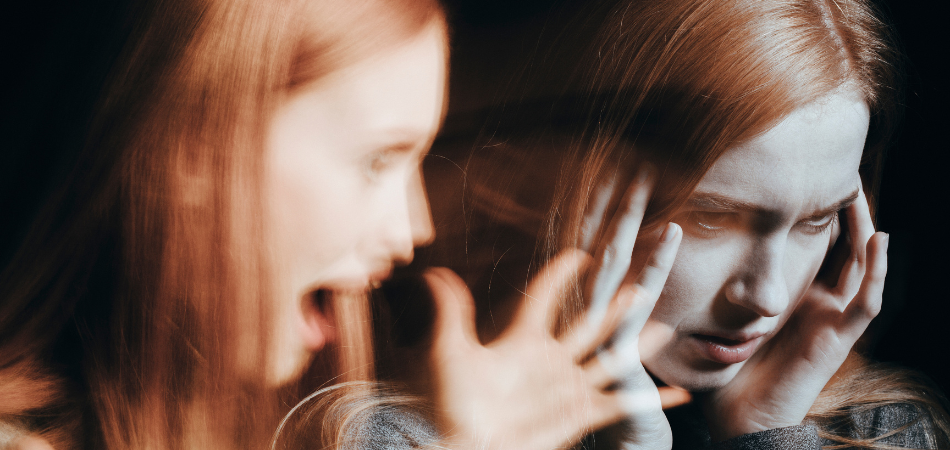Research has shown that individuals with schizophrenia may be more vulnerable to developing a substance addiction, acknowledging the importance of understanding the connection between schizophrenia and addiction and, as a result, how to manage dual diagnosis. If you or someone you know is facing this challenge, this page aims to serve as guidance and support.
What is schizophrenia?
Schizophrenia is a long-term mental health condition that affects how a person thinks, feels, and interacts with others. People with schizophrenia may have trouble distinguishing between what is real and what isn’t, which can make daily life challenging. It usually starts in early adulthood and requires ongoing treatment with medication and therapy to help manage its effects. Understanding and treating schizophrenia can be complex because it varies widely from person to person.
What are the signs of schizophrenia?
The signs of schizophrenia can vary from person to person due to its complex nature but often include:
- Hallucinations: Hearing or seeing things that aren’t there.
- Delusions: Strongly held false beliefs, such as thinking one has special powers or is being persecuted.
- Disorganised thinking: Trouble organising thoughts or connecting them logically.
- Abnormal motor behaviour: Unusual or repetitive movements or extreme stillness.
- Negative symptoms: Reduced ability to function normally, like showing little emotion, neglecting personal hygiene, or withdrawing from social activities.
Note: This section isn’t meant for self-diagnosis. If you feel you may be showing signs of schizophrenia, your first point of action should be to contact a medical health professional for further diagnosis.
Are there different types of schizophrenia?
Traditionally, schizophrenia was categorised into several subtypes, though these subtypes have been removed in the most recent Diagnostic and Statistical Manual of Mental Disorders (DSM-5) due to their limited diagnostic stability and low reliability. However, understanding these traditional subtypes can still be useful for grasping the diversity of symptoms and presentations. Here are the main types of schizophrenia:
Paranoid schizophrenia:
- Characterised by prominent delusions and auditory hallucinations.
- Delusions are often of persecution or grandeur.
- Cognitive functioning and affect are relatively preserved compared to other subtypes.
Disorganised schizophrenia:
- Marked by disorganised speech and behaviour.
- Inappropriate or flat affect.
- Severe disruption in the ability to perform daily activities.
Catatonic schizophrenia:
- Dominated by disturbances in movement.
- Symptoms can include motor immobility, excessive motor activity, extreme negativism, mutism, and peculiar movements.
- May also display echolalia (repeating others’ words) or echopraxia (mimicking others’ movements).
Undifferentiated schizophrenia:
- Displays symptoms that do not fit neatly into the paranoid, disorganised, or catatonic categories.
- A mix of symptoms from different subtypes.
Residual schizophrenia:
- Occurs in individuals who have experienced at least one episode of schizophrenia but currently have no prominent positive symptoms (e.g., delusions, hallucinations).
- Ongoing negative symptoms (e.g., social withdrawal, lack of emotion) or milder positive symptoms.
Despite the removal of these subtypes from DSM-5, the recognition of varying symptoms and presentations remains crucial in the treatment and understanding of schizophrenia. Current diagnostic practices focus on the spectrum of symptoms rather than distinct subtypes, emphasising a more personalised approach to treatment.
What causes schizophrenia?
Schizophrenia is a complex mental health disorder with no single known cause. Because of this, a lot of research points to certain areas, often with a mix of other variables.
So, for example:
- Genetics could play a significant role, meaning if you have a family history of schizophrenia, your risk may be higher.
- Imbalances in neurotransmitters like dopamine and glutamate are also linked to the disorder.
- Abnormalities in brain structure and function have shown links to schizophrenia.
- Environmental factors, such as prenatal exposure to viruses, urban birth, or experiencing childhood trauma, might trigger symptoms in those already predisposed.
Understanding schizophrenia involves looking at these interconnected aspects to provide effective treatment and support.
Is there a link between addiction and schizophrenia?
Research shows a strong link between schizophrenia and alcohol addiction, as well as links between schizophrenia and drug addiction. For instance, alcohol use disorders affect 21% to 86% of this group, while cannabis and cocaine use disorders impact 17% to 83% and 23%, respectively. These numbers are much higher compared to the general population.
These statistics highlight the urgent need for treatment plans that address both schizophrenia and substance use disorders together. The high rates of co-occurrence suggest that treating one condition without considering the other could lead to incomplete recovery and possible relapses.
For those with schizophrenia, substance use might be a way to cope with symptoms or medication side effects. However, substance abuse can worsen psychiatric symptoms, creating a vicious cycle of deteriorating mental health and addiction.
What is a dual diagnosis of schizophrenia and addiction?
A dual diagnosis happens when someone is dealing with both a mental health disorder and a substance use disorder at the same time. This means they’re facing two challenges simultaneously, making treatment more complex but also more essential.
Schizophrenia and addiction often go hand in hand, creating a particularly tough combination. Each condition can make the other worse. For example, someone with schizophrenia might turn to substances to ease their symptoms, which can lead to addiction. On the other hand, substance abuse can intensify schizophrenia symptoms, making it even harder to manage. Understanding and addressing both issues together is crucial for effective treatment and recovery.
How is a dual diagnosis of schizophrenia and addiction treated in rehab?
Treating both schizophrenia and addiction together can be challenging due to how closely these conditions are linked. It takes a specialised approach to address both effectively.
First, it’s important to ensure that schizophrenia symptoms are stable before starting rehab treatment. This is crucial because the mental challenges of addiction treatment can sometimes worsen schizophrenia symptoms. Once stability is achieved, individuals can begin a comprehensive rehab programme that includes necessary medications and personalised support.
Depending on the substance involved, detox might be necessary. Detoxification is the process where the body eliminates the addictive substance, and this often requires medical supervision to manage withdrawal symptoms safely and comfortably. Detox is a vital first step in preparing for the therapeutic work ahead.
The rehab programme includes various therapeutic approaches designed to support recovery and improve schizophrenia symptoms:
Dialectical Behaviour Therapy (DBT)
DBT helps with emotion regulation and improving relationships. It’s especially helpful for those with schizophrenia, teaching ways to manage emotions without turning to addictive substances.
Family therapy
Family therapy brings loved ones into the healing process. It fosters open communication and helps families understand the challenges of living with both schizophrenia and addiction.
Mindfulness-based therapy
This therapy uses mindfulness techniques, like meditation, to manage stress and emotions. It’s beneficial for both addiction and schizophrenia by helping with emotional regulation and reducing stress or anxiety.
Group therapy
Group therapy provides peer support, reducing feelings of isolation. Sharing experiences in a supportive group can boost self-esteem and offer valuable insights into managing both conditions.
What are the next steps?
If you or a loved one are experiencing schizophrenia and addiction, it’s important to seek help. Recognising the signs of schizophrenia and understanding the link between schizophrenia and drug addiction or alcohol addiction is the first step. Reach out to us today to get the support needed to find the best treatment for a healthier, balanced life. Don’t wait – help is available now.
Call our admissions line 24 hours a day to get help.








